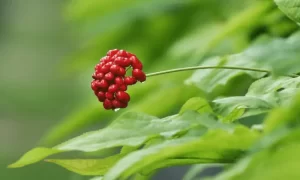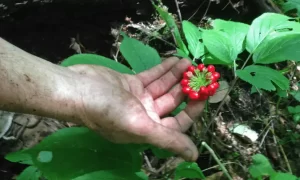Why Is Growing Ginseng Illegal? The plant American ginseng is native to the woods of the East Coast. It has been utilized for millennia by many Native American cultures. The herb has a variety of therapeutic applications. Ginseng has also been shown to be quite popular in China. A significant amount of ginseng is sent to China and the Far East every year.
According to a recent estimate provided by the US Fish and Wildlife Service, the value of ginseng harvesting earnings is over $27 million. This implies that ginseng harvesting is a significant source of profit for a large number of growers in the United States. However, you should follow a few guidelines before harvesting this root.
19 states of the USA allow free and unrestricted harvesting of ginseng. Those are:
- Alabama
- Arkansas
- Georgia
- Illinois
- Iowa
- Indiana
- New York
- North Carolina
- Ohio
- Pennsylvania
- Tennessee
- Vermont
- Virginia
- West Virginia
- Wisconsin
- Kentucky
- Maryland
- Minnesota
- Missouri
Three other states will only let you export ginseng that was produced and harvested artificially. Maine, Michigan, and Washington are the states in question. Growing, collecting, or exporting ginseng is now illegal in numerous states other than the ones listed above. This is due to the numerous laws and regulatory constraints that apply to the activity of cultivating and collecting this wild root.
Contents
Why Is Growing Ginseng Illegal? Illegal types Of Ginseng
There are no “illegal” varieties of ginseng. The illegality of the practice stems from the fact that it is cultivated in prohibited locations, not from the plant itself. Many individuals will try to cultivate and harvest it in ways that your state’s laws do not allow.
As previously said, if your state is not included on the list above, you may infer that growing or harvesting ginseng in your area is most certainly prohibited. Your best chance will be to continue purchasing ginseng online from trusted suppliers. Illegally growing ginseng has several disadvantages that you should avoid.
Read more about How to stop weeds from growing in gravel?
Legal Types of Ginseng
Ginseng of all varieties is allowed. If you live in one of the states listed above, you are allowed to cultivate ginseng at your own speed and discretion. The legal issue only arises when you attempt to cultivate or harvest ginseng in an area where the activity has not been formally sanctioned by state legislation.
It is also worth noting that there are numerous distinct kinds of “ginseng” that are not actual members of the ginseng family. Indian, Brazilian, and Siberian ginseng are among them. Although these plants are close enough to actual ginseng to be considered a “near miss,” they are not genuine members of the species.
However, because they are not members of the ginseng family, you may grow them in most locations. These imitators will be exempt from the limitations that apply to real ginseng. It is, however, unlawful to pass them off as genuine American ginseng. As a result, individuals employ the qualifiers “Brazilian” and “Siberian.”
How To Legally Harvest Wild Ginseng?
The following stages will be included in the lawful collection of wild ginseng:
- Ginseng plants must be at least 5 years old to be harvested. These are plants with at least four bud scars on the tops of their roots.
- Harvesting may only be done within an officially authorized state harvesting season.
- Before you legally engage in this practice, you may need to get a ginseng harvesting license.
- You must obtain authorization to harvest ginseng on land that does not belong to you.
- It is critical to only harvest plants that are currently producing berries. This will allow you to plant the seeds and ensure a continuous supply of ginseng for future harvesting.
Which Varieties of Ginseng Can You Grow?
As previously stated, there are several types of ginseng or ginseng imitations that can be lawfully grown. There is no need to be concerned about growing Brazilian, Siberian, or Indian ginseng. This is due to the fact that these are not genuine members of the ginseng family. As a result, there are no limitations on cultivating or harvesting these specific species.
True American ginseng can be grown lawfully at any time or place within the states indicated in the list above. You must follow all of the standards and limits that have been specified. If your state is not on the list, it is reasonable to conclude that cultivating ginseng is prohibited.
How To Grow Ginseng Legally?
- First, ensure that the ground is well prepared. The area should be cleared of any weeds or rubbish.
- Plant the seeds next. Distribute them promptly. The objective should be to distribute 6 to 12 seeds in a single square foot.
- Plant a lesser quantity of seeds in a more cautious manner next. These should be buried in 6 to 9 inches of topsoil. Plant them one inch apart.
- The following step is to cover the entire area with a blanket of leaves or mulch. The thickness of this blanket should be between 1 and 2 inches. It will help to keep the seeds wet.
- Make a note of the location where you planted. You can make use of a GPS gadget or another way. You won’t need to return to the location very often because wild ginseng doesn’t require much monitoring.
- Make certain that the place is maintained out of the reach of youngsters and dogs. Ginseng has to be allowed to develop naturally in order to reach its full potential.
Learn more about Why are mushrooms growing in my garden?
Conclusion: Why Is Growing Ginseng Illegal
Illegally collecting ginseng is a class one misdemeanor, and any extra charges incurred as a result of the harvesting can soon pile up. Trespassing penalties may be levied if harvesting occurs on private land. Going on a federally protected ground, such as a national forest, can result in criminal prosecution. Stealing the plant might potentially result in larceny charges. Digging up more than $200 in wild ginseng leads to criminal charges.
Read more about Can You Eat Ginseng Berries? The Reason You Should Know
While the state strives to save ginseng from going extinct, harvesters are also obligated to replace the harvested plant’s seeds. According to the legislation, they must sow such seeds at the harvest location at the time of harvest.



